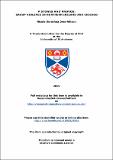Files in this item
P stones and provos : group violence in Northern Ireland and Chicago
Item metadata
| dc.contributor.advisor | English, Richard | |
| dc.contributor.author | Ives-Allison, Nicole D. | |
| dc.coverage.spatial | 213 p. | en_US |
| dc.date.accessioned | 2015-07-07T15:45:10Z | |
| dc.date.available | 2015-07-07T15:45:10Z | |
| dc.date.issued | 2015-06-23 | |
| dc.identifier.uri | https://hdl.handle.net/10023/6925 | |
| dc.description.abstract | Although the government of the United States of America was established to protect the rights to life, liberty and the pursuit of happiness among all American citizens, this thesis argues intractable gang violence in inner-city Chicago has persistently denied these rights, in turn undermining fundamental (and foundational) American political values. Thus, gang violence can be argued to represent a threat to both civil order and state legitimacy. Yet, where comparable (and generally lower) levels of community-level violence in Northern Ireland garnered the sustained attention and direct involvement of the United Kingdom's central government, the challenge posed by gang violence has been unappreciated, if not ignored, by the American federal government. In order to mobilise the political commitment and resources needed to find a durable resolution to Chicago's long and often anarchic 'uncivil war', it is first necessary to politicise the problem and its origins. Contributing to this politicisation, this thesis explains why gang violence in Chicago has been unable to capture the political imagination of the American government in a way akin to paramilitary (specifically republican) violence in Northern Ireland. Secondly, it explains how the depoliticisation of gang violence has negatively affected response, encouraging the continued application of inadequate and largely ineffective response strategies. Finally, it makes the case that, while radical, a conditional agreement-centric peace process loosely modelled on that employed in Northern Ireland might offer the most effective strategy for restoring the sense of peace and security to inner-city Chicago lost over half a century ago. | en_US |
| dc.language.iso | en | en_US |
| dc.publisher | University of St Andrews | |
| dc.rights | Creative Commons Attribution-NonCommercial-NoDerivatives 4.0 International | |
| dc.rights.uri | http://creativecommons.org/licenses/by-nc-nd/4.0/ | |
| dc.subject | Gangs | en_US |
| dc.subject | Political violence | en_US |
| dc.subject | Chicago | en_US |
| dc.subject | Northern Ireland | en_US |
| dc.subject | Community violence | en_US |
| dc.subject | Violence reduction | en_US |
| dc.subject | Paramilitary violence | en_US |
| dc.subject | The Troubles | en_US |
| dc.subject | Gang-specific policing | en_US |
| dc.subject | Nationalism | en_US |
| dc.subject | Sectarianism | en_US |
| dc.subject | Conflict transformation | en_US |
| dc.subject | Peace process | en_US |
| dc.subject | Negotiation | en_US |
| dc.subject.lcc | HV6439.U7C384I8 | |
| dc.subject.lcsh | Gangs--Illinois--Chicago | en_US |
| dc.subject.lcsh | Political violence--Northern Ireland | en_US |
| dc.subject.lcsh | Political violence--United States | en_US |
| dc.subject.lcsh | Violence--Prevention | en_US |
| dc.subject.lcsh | Northern Ireland--History | en_US |
| dc.title | P stones and provos : group violence in Northern Ireland and Chicago | en_US |
| dc.type | Thesis | en_US |
| dc.contributor.sponsor | Handa Centre for the Study of Terrorism and Political Violence (CSTPV) | en_US |
| dc.type.qualificationlevel | Doctoral | en_US |
| dc.type.qualificationname | PhD Doctor of Philosophy | en_US |
| dc.publisher.institution | The University of St Andrews | en_US |
This item appears in the following Collection(s)
Except where otherwise noted within the work, this item's licence for re-use is described as Creative Commons Attribution-NonCommercial-NoDerivatives 4.0 International
Items in the St Andrews Research Repository are protected by copyright, with all rights reserved, unless otherwise indicated.


